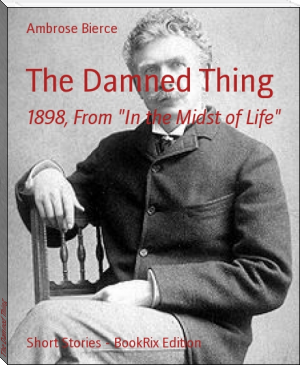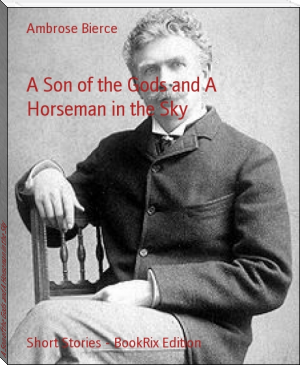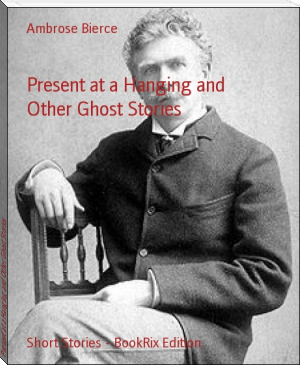Can Such Things Be? - Ambrose Bierce (thriller novels to read TXT) 📗

- Author: Ambrose Bierce
Book online «Can Such Things Be? - Ambrose Bierce (thriller novels to read TXT) 📗». Author Ambrose Bierce
Yet he was not altogether a fool in his day and generation; being cold and hungry, and still able to walk a little by bending his knees very much indeed and putting his feet down toes first, he decided to enter one of the houses which flanked the street at long intervals and looked so bright and warm. But when he attempted to act upon that very sensible decision a burly dog came bowsing out and disputed his right. Inexpressibly frightened and believing, no doubt (with some reason, too) that brutes without meant brutality within, he hobbled away from all the houses, and with gray, wet fields to right of him and gray, wet fields to left of him--with the rain half blinding him and the night coming in mist and darkness, held his way along the road that leads to Greenton. That is to say, the road leads those to Greenton who succeed in passing the Oak Hill Cemetery. A considerable number every year do not.
Jo did not.
They found him there the next morning, very wet, very cold, but no longer hungry. He had apparently entered the cemetery gate--hoping, perhaps, that it led to a house where there was no dog--and gone blundering about in the darkness, falling over many a grave, no doubt, until he had tired of it all and given up. The little body lay upon one side, with one soiled cheek upon one soiled hand, the other hand tucked away among the rags to make it warm, the other cheek washed clean and white at last, as for a kiss from one of God's great angels. It was observed--though nothing was thought of it at the time, the body being as yet unidentified--that the little fellow was lying upon the grave of Hetty Parlow. The grave, however, had not opened to receive him. That is a circumstance which, without actual irreverence, one may wish had been ordered otherwise.
THE NIGHT-DOINGS AT "DEADMAN'S" A STORY THAT IS UNTRUE
It was a singularly sharp night, and clear as the heart of a diamond. Clear nights have a trick of being keen. In darkness you may be cold and not know it; when you see, you suffer. This night was bright enough to bite like a serpent. The moon was moving mysteriously along behind the giant pines crowning the South Mountain, striking a cold sparkle from the crusted snow, and bringing out against the black west the ghostly outlines of the Coast Range, beyond which lay the invisible Pacific. The snow had piled itself, in the open spaces along the bottom of the gulch, into long ridges that seemed to heave, and into hills that appeared to toss and scatter spray. The spray was sunlight, twice reflected: dashed once from the moon, once from the snow.
In this snow many of the shanties of the abandoned mining camp were obliterated, (a sailor might have said they had gone down) and at irregular intervals it had overtopped the tall trestles which had once supported a river called a flume; for, of course, "flume" is flumen. Among the advantages of which the mountains cannot deprive the gold-hunter is the privilege of speaking Latin. He says of his dead neighbor, "He has gone up the flume." This is not a bad way to say, "His life has returned to the Fountain of Life."
While putting on its armor against the assaults of the wind, this snow had neglected no coign of vantage. Snow pursued by the wind is not wholly unlike a retreating army. In the open field it ranges itself in ranks and battalions; where it can get a foothold it makes a stand; where it can take cover it does so. You may see whole platoons of snow cowering behind a bit of broken wall. The devious old road, hewn out of the mountain side, was full of it. Squadron upon squadron had struggled to escape by this line, when suddenly pursuit had ceased. A more desolate and dreary spot than Deadman's Gulch in a winter midnight it is impossible to imagine. Yet Mr. Hiram Beeson elected to live there, the sole inhabitant.
Away up the side of the North Mountain his little pine-log shanty projected from its single pane of glass a long, thin beam of light, and looked not altogether unlike a black beetle fastened to the hillside with a bright new pin. Within it sat Mr. Beeson himself, before a roaring fire, staring into its hot heart as if he had never before seen such a thing in all his life. He was not a comely man. He was gray; he was ragged and slovenly in his attire; his face was wan and haggard; his eyes were too bright. As to his age, if one had attempted to guess it, one might have said forty-seven, then corrected himself and said seventy-four. He was really twenty-eight. Emaciated he was; as much, perhaps, as he dared be, with a needy undertaker at Bentley's Flat and a new and enterprising coroner at Sonora. Poverty and zeal are an upper and a nether millstone. It is dangerous to make a third in that kind of sandwich.
As Mr. Beeson sat there, with his ragged elbows on his ragged knees, his lean jaws buried in his lean hands, and with no apparent intention of going to bed, he looked as if the slightest movement would tumble him to pieces. Yet during the last hour he had winked no fewer than three times.
There was a sharp rapping at the door. A rap at that time of night and in that weather might have surprised an ordinary mortal who had dwelt two years in the gulch without seeing a human face, and could not fail to know that the country was impassable; but Mr. Beeson did not so much as pull his eyes out of the coals. And even when the door was pushed open he only shrugged a little more closely into himself, as one does who is expecting something that he would rather not see. You may observe this movement in women when, in a mortuary chapel, the coffin is borne up the aisle behind them.
But when a long old man in a blanket overcoat, his head tied up in a handkerchief and nearly his entire face in a muffler, wearing green goggles and with a complexion of glittering whiteness where it could be seen, strode silently into the room, laying a hard, gloved hand on Mr. Beeson's shoulder, the latter so far forgot himself as to look up with an appearance of no small astonishment; whomever he may have been expecting, he had evidently not counted on meeting anyone like this. Nevertheless, the sight of this unexpected guest produced in Mr. Beeson the following sequence: a feeling of astonishment; a sense of gratification; a sentiment of profound good will. Rising from his seat, he took the knotty hand from his shoulder, and shook it up and down with a fervor quite unaccountable; for in the old man's aspect was nothing to attract, much to repel. However, attraction is too general a property for repulsion to be without it. The most attractive object in the world is the face we instinctively cover with a cloth. When it becomes still more attractive-- fascinating--we put seven feet of earth above it.
"Sir," said Mr. Beeson, releasing the old man's hand, which fell passively against his thigh with a quiet clack, "it is an extremely disagreeable night. Pray be seated; I am very glad to see you."
Mr. Beeson spoke with an easy good breeding that one would hardly have expected, considering all things. Indeed, the contrast between his appearance and his manner was sufficiently surprising to be one of the commonest of social phenomena in the mines. The old man advanced a step toward the fire, glowing cavernously in the green goggles. Mr. Beeson resumed:
"You bet your life I am!"
Mr. Beeson's elegance was not too refined; it had made reasonable concessions to local taste. He paused a moment, letting his eyes drop from the muffled head of his guest, down along the row of moldy buttons confining the blanket overcoat, to the greenish cowhide boots powdered with snow, which had begun to melt and run along the floor in little rills. He took an inventory of his guest, and appeared satisfied. Who would not have been? Then he continued:
"The cheer I can offer you is, unfortunately, in keeping with my surroundings; but I shall esteem myself highly favored if it is your pleasure to partake of it, rather than seek better at Bentley's Flat."
With a singular refinement of hospitable humility Mr. Beeson spoke as if a sojourn in his warm cabin on such a night, as compared with walking fourteen miles up to the throat in snow with a cutting crust, would be an intolerable hardship. By way of reply, his guest unbuttoned the blanket overcoat. The host laid fresh fuel on the fire, swept the hearth with the tail of a wolf, and added:
"But _I_ think you'd better skedaddle."
The old man took a seat by the fire, spreading his broad soles to the heat without removing his hat. In the mines the hat is seldom removed except when the boots are. Without further remark Mr. Beeson also seated himself in a chair which had been a barrel, and which, retaining much of its original character, seemed to have been designed with a view to preserving his dust if it should please him to crumble. For a moment there was silence; then, from somewhere among the pines, came the snarling yelp of a coyote; and simultaneously the door rattled in its frame. There was no other connection between the two incidents than that the coyote has an aversion to storms, and the wind was rising; yet there seemed somehow a kind of supernatural conspiracy between the two, and Mr. Beeson shuddered with a vague sense of terror. He recovered himself in a moment and again addressed his guest.
"There are strange doings here. I will tell you everything, and then if you decide to go I shall hope to accompany you over the worst of the way; as far as where Baldy Peterson shot Ben Hike--I dare say you know the place."
The old man nodded emphatically, as intimating not merely that he did, but that he did indeed.
"Two years ago," began Mr. Beeson, "I, with two companions, occupied this house; but when the rush to the Flat occurred we left, along with the rest. In ten hours the Gulch was deserted. That evening, however, I discovered I had left behind





Comments (0)